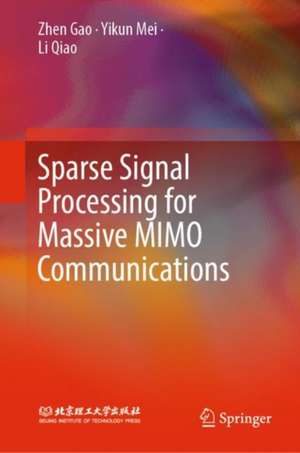Sparse Signal Processing for Massive MIMO Communications
Autor Zhen Gao, Yikun Mei, Li Qiaoen Limba Engleză Hardback – 17 oct 2023
Preț: 739.20 lei
Preț vechi: 972.64 lei
-24% Nou
Puncte Express: 1109
Preț estimativ în valută:
141.44€ • 148.08$ • 117.04£
141.44€ • 148.08$ • 117.04£
Carte tipărită la comandă
Livrare economică 02-08 aprilie
Preluare comenzi: 021 569.72.76
Specificații
ISBN-13: 9789819953936
ISBN-10: 9819953936
Pagini: 217
Ilustrații: XVI, 217 p. 87 illus., 69 illus. in color.
Dimensiuni: 155 x 235 mm
Greutate: 0.5 kg
Ediția:1st ed. 2024
Editura: Springer Nature Singapore
Colecția Springer
Locul publicării:Singapore, Singapore
ISBN-10: 9819953936
Pagini: 217
Ilustrații: XVI, 217 p. 87 illus., 69 illus. in color.
Dimensiuni: 155 x 235 mm
Greutate: 0.5 kg
Ediția:1st ed. 2024
Editura: Springer Nature Singapore
Colecția Springer
Locul publicării:Singapore, Singapore
Cuprins
Introduction.- Massive MIMO Performance Analysis and Channel Estimation Scheme in Sparse Channels.- Channel Estimation Based on Structured Compressed Sensing Theory in FDD Massive MIMO Systems.- Channel Feedback Based on Distributed Compressed Sensing Theory in FDD Massive MIMO Systems.- Channel Estimation and Beamforming Based on Compressed Sensing Theory in mmWave Massive MIMO Systems.- Sparse Channel Estimation Based on Spectral Estimation Theory for mmWave Massive MIMO Systems.- Quasi-Optimal Signals Detection for Massive Spatial Modulation MIMO Systems Based on Structured Compressed Sensing.- Multiuser Signal Detection Based on Compressed Sensing for Massive Media Modulation MIMO Systems.- Compressed Sensing Mass Access Techniques in Medium Modulation Assisted IoT Machine Type Communication.- Time-varying Channel Estimation Based on Compressed Sensing Theory for TDS-OFDM Systems.- Summary and Prospects for Massive MIMO Technology.
Notă biografică
Zhen Gao received the B.S. degree in information engineering from Beijing Institute of Technology, Beijing, China, in 2011 and the Ph.D. degree in communication and signal processing from Tsinghua National Laboratory for Information Science and Technology, Department of Electronic Engineering, Tsinghua University, China, in 2016. He is currently Assistant Professor at Beijing Institute of Technology. His research interests are in wireless communications, with a focus on multi-carrier modulations, multiple antenna systems, and sparse signal processing. He was a recipient of the IEEE Broadcast Technology Society 2016 Scott Helt Memorial Award (Best Paper), the Exemplary Reviewer of IEEE COMMUNICATIONS LETTERS in 2016, the IET ELECTRONICS LETTERS Premium Award (Best Paper) 2016, the Young Elite Scientists Sponsorship Program (2018–2020) from China Association for Science and Technology, the Elsevier China Highly Cited Scholar (2020), and the First Prize of Natural Science granted by Chinese Institute of Electronics.
Textul de pe ultima copertă
The book focuses on utilizing sparse signal processing techniques in designing massive MIMO communication systems. As the number of antennas has been increasing rapidly for years, extremely high-dimensional channel matrix and massive user access urge for algorithms with much higher efficiency. This book provides in-depth discussions on compressive sensing techniques and simulates the performance on wireless systems. The easy-to-understand instructions with detailed simulations and open-sourced codes provide convenience for readers such as researchers, engineers, and graduate students in the fields of wireless communications.
Caracteristici
Is the first book to apply sparse signal processing in wireless communication systems systematically
Describes the physical (PHY) layer algorithm design in detail with considerable open-source codes
Gives explanations of basic theories on massive MIMO and sparse signal processing for starters to follow and learn
Describes the physical (PHY) layer algorithm design in detail with considerable open-source codes
Gives explanations of basic theories on massive MIMO and sparse signal processing for starters to follow and learn
